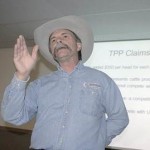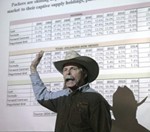Capital Press: TPP would be ‘death knell’ for industry, R-CALF leader says
TPP would be ‘death knell’ for industry, R-CALF leader says
Capital Press
Published:February 15, 2016 10:28AM
Matthew Weaver/Capital Press R-CALF CEO Bill Bullard outlines some of the problems with the Trans-Pacific Partnership trade agreement for U.S. cattle producers Feb. 10 during a meeting in Spokane.
Matthew Weaver/Capital Press R-CALF CEO Bill Bullard outlines some of the problems with the Trans-Pacific Partnership trade agreement for U.S. cattle producers Feb. 10 during a meeting in Spokane.
R-CALF CEO Bill Bullard spoke to Eastern Washington ranchers about the effect the Trans-Pacific Partnership will have on their industry in Spokane.
SPOKANE — The Trans-Pacific Partnership trade agreement would be a “death knell” for U.S. ranchers, an industry organization’s leader says.
Under TPP, meat packers could slaughter foreign-sourced beef in the United States and have it be considered a U.S. product, shipping it to other countries duty-free, said Bill Bullard, CEO of R-CALF in Billings, Mont. R-CALF represents independent cattle producers.
“The TPP is a license for the multi-national meat packers to steal from you, your good name, your image, your reputation and affix your good name, image and reputation on beef from animals sourced anywhere in the world with a USA label,” Bullard said.
Lamb, mutton and pork would also be affected, he told Eastern Washington cattle producers.
Others in the beef industry have voiced support for TPP, saying it would increase access and decrease tariffs on U.S. beef when shipping to other countries. The National Cattlemen’s Beef Association said that the agreement is not perfect, but represents a “vast improvement” over current tariff rates into Japan.
Bullard said the trade partners in the TPP don’t represent much more marketing opportunity for U.S. ranchers. Australia, Canada, Mexico and New Zealand are four of the largest beef and cattle exporters in the world and the 11 countries included in the TPP produce more beef than they can consume, he said. Without the United States, they represent 103 million head of cattle, third to India and Brazil in herd size.
“Is that what you would select as an ideal group of countries to have a free trade agreement so we can lift our economy up domestically? Absolutely not,” Bullard said.
Vietnam and Japan are the most meaningful opportunities, Bullard said, but the United States already has a third of Vietnam’s beef market, while Japan’s population and beef consumption are declining.
The number of cattle ranchers and size of cattle herds has declined in the wake of previous trade agreements, Bullard said. He said the industry now consists of four large national packing companies, which slaughter roughly 85 percent of all U.S.-fed cattle.
It’s in beef packers’ interest to source foreign livestock against domestic livestock, Bullard said.
“Producers want the meat packers to source their cattle domestically,” Bullard said. “Meat packers want to expand their access to sources around the world, so they can leverage those foreign sources to lower the prices of the domestic product.”
Bullard said he would like to see meat packers and feedlots separated, as they were in the early 1980s, or regulated as “monopolistic structures.”
R-CALF believes the U.S. should withdraw completely or scale back from the World Trade Organization instead of giving up its negotiating authority, he said. The U.S. recently repealed its country of origin label law after the WTO ruled it was unfair to Canada and Mexico because it depressed cattle prices.
Bullard doesn’t expect the TPP to be brought up in Congress until after the presidential election. He expects President Barack Obama to try to get the Senate to ratify the agreement during the lame-duck session after the November election.
Bullard spoke before a joint meeting of the Spokane County Cattlemen and Cattle Producers of Washington in Spokane. He recommended that ranchers contact their members of Congress.
Online

